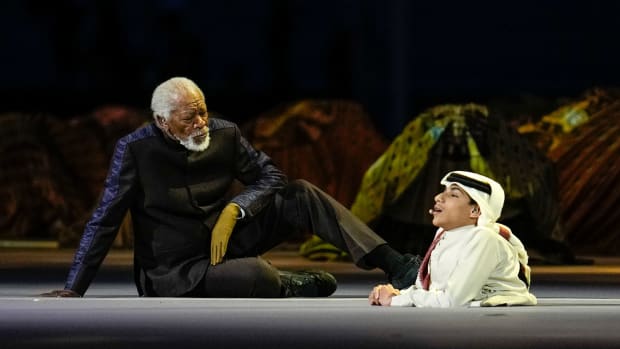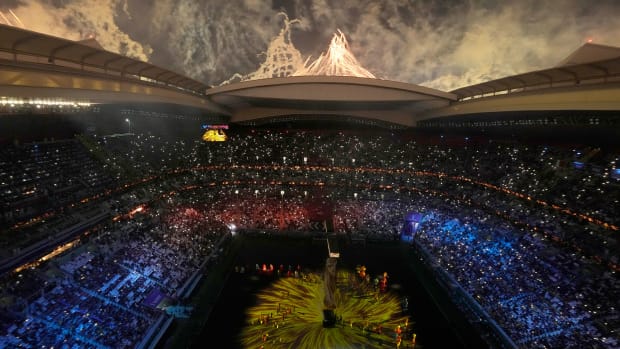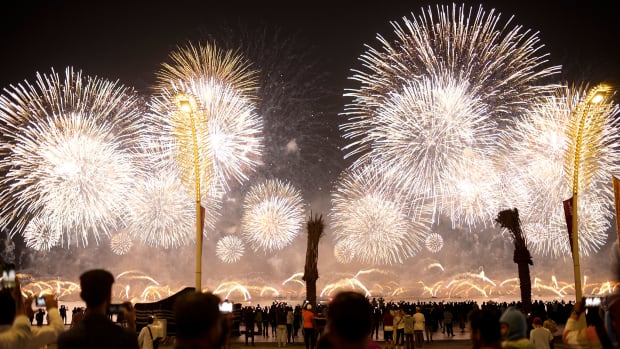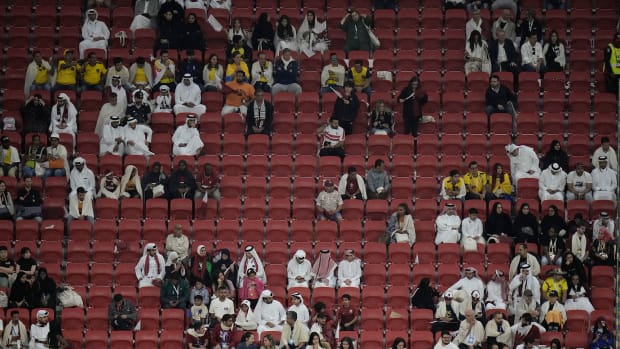AL KHOR, QATAR – Twelve years. Twelve years. That’s how long it took for the most controversial World Cup in the tournament’s nearly century-old history to foment and form, to fill coffers and inspire and divide and stumble forward. Twelve years of death for migrant workers and displacement of citizens; of brand-new stadiums rising like palatial mirages from flat, arid desert sand; of hand-wringing and hop-wrangling and vast cultural divides that only seem to grow wider by the day.
Then, finally, there it was, like a beer station resting atop a sand dune on the near horizon, taps full but prices steep. Soccer. The beautiful game. Often, a unifying force. The sport that’s supposed to be the whole point of this extravaganza but isn’t here, not yet.
The mood shifted that way on Sunday, shifted toward the soccer and the tournament. It excused nothing that happened in the lead-up. It didn’t align with FIFA’s stated theme, “the unique idea of encompassing an idea of bridging distances,” which reads like gibberish that even Morgan Freeman’s silky smooth baritone booming over Al Bayt Stadium couldn’t sell.

Natacha Pisarenko/AP
But after a week where tension heightened by the hour, where FIFA’s president went full Austin Powers-Dr. Evil and where the host country sent strong-and-unnecessary signals that it alone would govern what was and wasn’t allowed within its borders, the hours before kickoff felt … deliriously light.
Anyone who took an afternoon spin around the area saw real-deal, honest-to-goodness, actual sports fandom. Again, all that changed was the mood. Still … the mood needed changing, even a brief respite from the heavy weight of geopolitics and human rights and tracking phones.
At a plaza roughly a mile from the perimeter, three teenagers from Egypt sat on a bench, baking in the sun and eating candy, hours before Qatar and Ecuador began their lopsided clash. Wind whipped so fiercely that garbage flew and flags strained and dust blew into uncovered eyes. The kids asked anyone who passed which teams they rooted for, before extolling their own love for Brazil, Argentina and Qatar, respectively. This wasn’t an idea of an idea encompassing anything, nor a bridge over swirling sand. But it was delightfully simple, a familiar human connection, between people who adore games that tether sports fans and make events like these international in scope.
Inside an Indian restaurant in the same plaza, The Spice, there was a waiter who had moved to Qatar eight months ago, joining the class of migrant workers that make up some 90 % of the population. He toiled in hotels and the restaurants those hotels owned, day after day, in pursuit of the same dream, the one that started in his youth, before he became a striker and climbed higher up levels of India’s youth development system. He wanted to watch his favorite team, Brazil, play in the World Cup. That was the dream. He also loved Ronaldinho and Lionel Messi, and he sometimes used "Messi” as his own last name. Shankar Messi just sounded right.
Shankar moved in with his brother, who already lived in Qatar, slept on a couch and saved up tips. But when he finally saved enough, he realized he lacked something else he needed: a credit card. “I thought my dream would not come true,” he said. “I would have to go back to India.” But his brother managed to secure Shankar a ticket to one of Tunisia’s games, which motivated him to stay. In the meantime, he could still hunt for that coveted Brazil ticket. And there it was, the power of sports, the allure of the World Cup, the why. (Here’s to hoping he finds one.)
Did Shankar feel for the migrant workers who had died? Yes, of course. But that had not deterred him. Nothing would, he said.

Thanassis Stavrakis/AP
With almost nothing between the plaza and Al Bayt Stadium besides random office buildings and run-down factories and dust storms, fans shaped the vibe as they powered through the wind tunnels. A man draped in a Sudanese flag sauntered by, while making sure to note that Sudan had not advanced to the World Cup but that “pride matters, my friend, above all.” Three generations of the same family poked their heads outside their front gate, all laughing and pointing and trying to make sense of what hardly made any sense at all.
The first World Cup being held in the Middle East would begin at 7 p.m. local time. And, for once, the chatter centered on Qatar’s national team, its chances and whether The Maroon could prevent becoming the first host country to lose its first game of a World Cup, which hadn’t happened in the first 21 installments.
As minutes, then hours, ticked by, the scene started to feel like a sporting event, despite the backdrop that has lingered and will linger over the World Cup for the next month. Fans streamed down sidewalks, carrying flags from myriad countries. Drivers hunted for available parking spots. Bathroom lines formed and snaked. One father and his son, the boy maybe 8 years old or so and clad in a Ronaldinho jersey, skipped, arm and arm, joined by blood, soccer and delirium. Parking lot entrepreneurs peddled scarves, T-shirts and, for one man, homemade Moroccan flutes he tried to give away as “gifts,” while asking for tips in return, a trick familiar to anyone who has ever visited Manhattan.
None of this changed the baseline. But it was a welcomed shift, nonetheless, the distance between “fraught and uneasy” to “fraught and uneasy with both a palatable atmosphere and a surreal scene and actual sports.” Fans from all over the world meant, literally, just that. Male Qatari supporters came dressed in thobes, their traditional long, white and flowing gowns; Ecuadorians wore brightly colored headdresses; Brazilians arrived with hair dyed neon green.
The wind that whirled served as an apt metaphor for Sunday night. Outside the stadium, revelers shielded their faces and helicopters zoomed by overhead, as if everyone had been transported inside The Fugitive. Inside, though, the wind didn’t exist. But an elaborate stage, a famous actor and a soccer-as-stage-performance did.

Francisco Seco/AP
The opening ceremony featured a director, seven acts, chants, inflatable mascots, gigantic jerseys, a flying LED screen, a studio orchestra and costumes. Plus: a K-pop icon (Jung Kook of BTS fame) and a famous Qatari singer, producer and human rights activist (Fahad Al Kubaisi). And: a fireworks display, strobe lights, smoke, a stadium ceiling designed like a tapestry, dancers waving long and curved and shiny swords, shirtless drummers, wraparound sunglasses. And: dignitaries, like the Emir of Qatar, Sheikh Tamim bin Hamad Al Thani, who addressed the crowd in multiple languages. What a combination: empty perimeter, huge windstorm, theatrical atmosphere, uncomfortable backdrop, unchanged baseline and all the rest.
It took place inside of Al Bayt, which means “the house” in Arabic and was designed to resemble a bedouin tent. A giant gold trophy was placed at the center of the pitch. And all of this, the everything else, quickly turned into the highlight of the night for local football fans.
Qatar, perhaps due to nerves, an off night, or a roster not ready for this type of grand stage, struggled right from the start. Ecuador had a goal three minutes in chalked off upon VAR review but two more stand up within the first 31 minutes. Its fans went on to chant, in Spanish, “We want beer!” What seemed like at least a third of the 60,000-capacity crowd all-but sprinted toward the exits early, leaving the first World Cup game played in the Middle East, one in which the host country was competing, far before the end.

Hassan Ammar/AP
So Qatar became the first host country to lose its World Cup opener. It became the first host country since Mexico in 1970 to not score in its first game (Mexico tied the Soviet Union, 0-0.) And it won’t get easier, with the Netherlands and Senegal up next.
Still, Qatar’s national team has made progress, in the on-field sense. It won the Asian Cup three years ago, toppling Japan in the final, and finished third in the Arab Cup in 2021. But this kind of performance, the kind that stood in such contrast to on-field-but-not-soccer extravaganza, isn’t likely to dent the criticism that Qatar the country has faced. Not that it should have, anyway. But triumphs tend to mask problems, and the problems here run deep.
That was Sunday, at the World Cup opener, a night that, in some ways, embodied the week that preceded it. There was tradition on display, the pageantry elevated, the VIP fans with their vodka tonics and sommelier-chosen wine and the commoners who sat below them, not to mention that backdrop and everything it took for that first game to be held. It was distinct. It was hard to reconcile. It was clumsy and not what the hosts envisioned. But at least on Sunday there was soccer, and if there is one thing that can save this tournament, or change the conversations, it’s going to have to be the games themselves.







